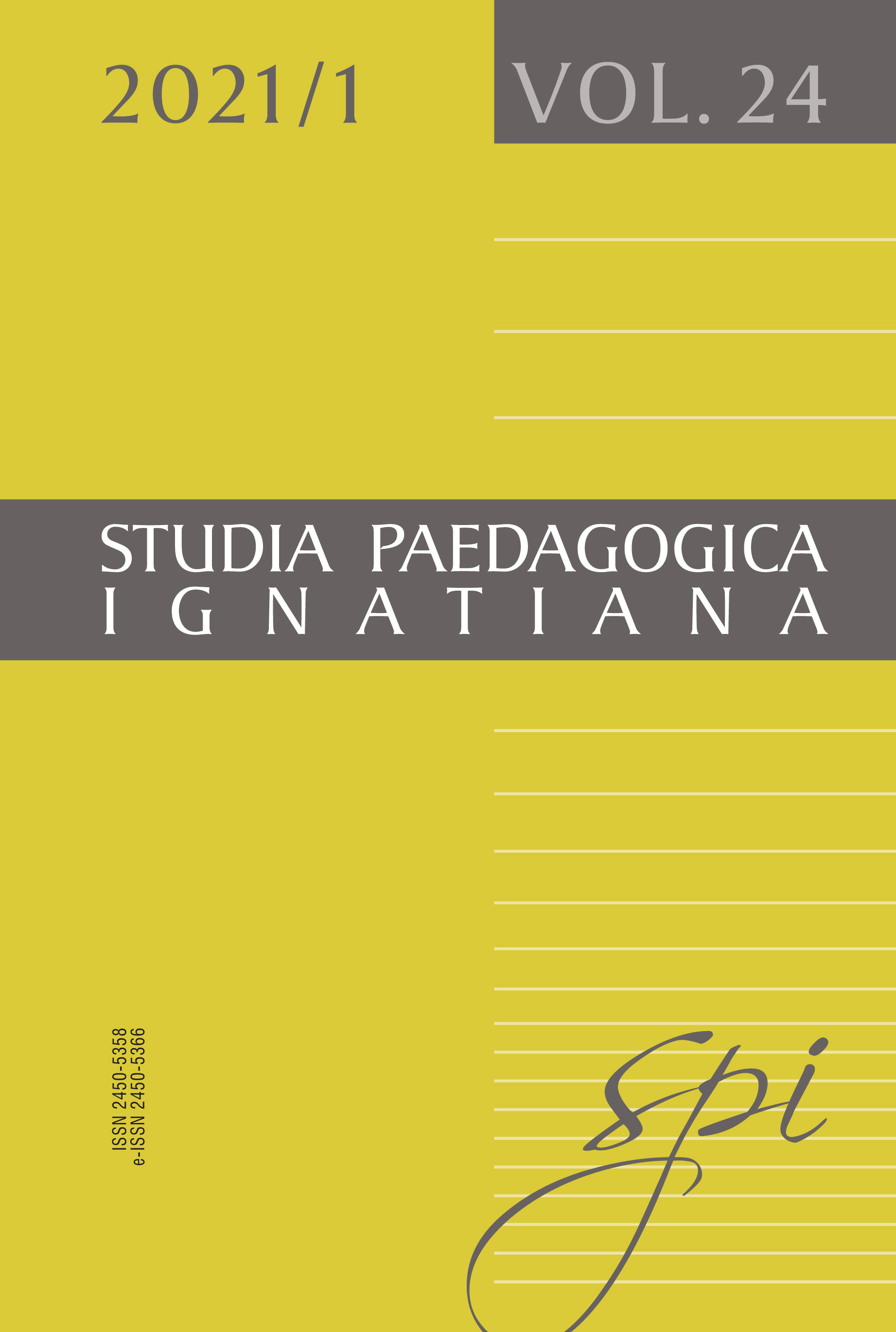Axiological Awareness and Man’s Identity
Educational Perspective (Analyses and Reflections)
DOI:
https://doi.org/10.12775/SPI.2021.1.004Keywords
awareness, axiology, education, identity, manAbstract
Reflections on and analyses of axiological awareness and identity are important for at least two reasons. Firstly, the subject of upbringing is a moral one; secondly, one can hardly have any influence on a subject unaware of who she/he is, what his/her ontological constitution and anthropological space are. The present reflections are located within the domain of education (at all its stages). At the same time, axiological awareness, identity and ethical subjectivi-ty underlie various portions of the pedagogic discourse, including those that we are not, upon first glance, used to identify with pedagogics and philosophy of education. It turns out that the multiplicity of these reflec-tions – more often materializing in an implicit manner, less often called by name, elaborated into fully apprehended paradigms – make up a multi-colored mosaic of deliberations upon the manner of operating as educational subjects. Therefore, axiological awareness, identity and ethical subjectivity un-derlie the same conceptuality which encompasses the arbitrariness of educational anthropology. At the same time, the ethical way of being amounts to the most adequate one: the question about good is the first criterion of rationality in it. Axiological awareness constitutes a ne-cessity of a sensible response to the reality of life thus understood. In itself – as a negation of ignorance – it presupposes a sense of ethical causality, subjectivity. It appears that only a man aware of his own axiology, convinced of the ability to actively participate in the world of obligations, negating the post-modernistic inertia, preferring crea-tive change over indolence caused by torpor – should be the parenetic model in education.References
Ablewicz K. (2003). Teoretyczne i metodologiczne podstawy pedagogiki antropologicznej, Kraków: Wydawnictwo Uniwersytetu Jagiellońskiego.
Czeżowski T. (1989). Uwagi o etyce jako nauce empirycznej, [w:] T. Czeżowski, Pisma z etyki i teorii wartości, red. P. Smoczyński, Wrocław: Zakład Narodowy im. Ossolińskich, s. 171–221.
Filek J. (2001). Filozofia jako etyka. Eseje filozoficzno-etyczne, Kraków: Znak.
Frankl V.E (2013). Człowiek w poszukiwaniu sensu, przeł. A. Wolnicka, Warszawa: Wydawnictwo „Czarna Owca”.
Gnitecki J. (1999). Zarys pedagogiki ogólnej, Gorzów Wielkopolski: Wojewódzki Ośrodek Metodyczny.
Homplewicz J. (2000). Etyka pedagogiczna, Warszawa: Wydawnictwo Salezjańskie.
Kostkiewicz J. (2005). Świadomość antropologiczno-aksjologiczna pedagogów, [w:] Ewolucja „ogólności” w dyskursach pedagogicznych, red. T. Hejnicka-Bezwińska, R. Leppert, Bydgoszcz: Wydawnictwo Uniwersytetu Kazimierza Wielkiego, s. 278–282.
Kostkiewicz J. (2008). Wychowanie do wolności wyboru. Ponadczasowy wymiar pedagogiki Fryderyka Wilhelma Foerstera, Kraków: Oficyna Wydawnicza „Impuls”.
Kotłowski K. (1976). Aksjologiczne podstawy teorii wychowania moralnego, Wrocław: Zakład Narodowy im. Ossolińskich.
Kowalski M., Falcman D. (2010a), Edukacyjne kierunkowskazy. Refleksje o współczesnej teorii pedagogicznej, [w:] Edukacja alternatywne w XXI wieku, red. Z. Melosik, B. Śliwerski, Kraków: Oficyna Wydawnicza „Impuls”.
Kowalski M., Falcman D. (2010b). Świadomość społeczna jako przestrzeń niewspółmierności Logosów: racjonalności linearnej, logiki dwuwartościowej i triady aksjologicznej a wymiary świata ponowoczesnego (konsekwencje dla pedagogiki i socjologii wiedzy), [w:] Przestrzeń edukacyjna – dylematy, doświadczenia i oczekiwania społeczne, red. M. Kowalski, A. Pawlak, A. Famuła-Jurczak, Kraków: Oficyna Wydawnicza „Impuls”, s. 59–80.
MacIntyre A. (1996). Dziedzictwo cnoty. Studium z teorii moralności, przeł. A. Chmielewski, Warszawa: Wydawnictwo Naukowe PWN.
Michalski J.T. (2011). Sens życia a pedagogika. Impulsy myśli Viktora E. Frankla, Toruń: Wydawnictwo Naukowe UMK.
Nowak M. (2004). Pedagogika personalistyczna, [w:] Pedagogika. Podręcznik akademicki, t. 1, red. Z. Kwieciński, B. Śliwerski, Warszawa: Wydawnictwo Naukowe PWN, s. 232–247.
Rawls J. (1994). Teoria sprawiedliwości, przeł. M. Panufnik, J. Pasek, A. Romaniuk, Warszawa: Wydawnictwo Naukowe PWN.
Szmatka J. (2007). Małe struktury społeczne. Wstęp do mikrosocjologii strukturalnej, Warszawa: Wydawnictwo Naukowe PWN.
Śliwerski B. (2009). Teoretycy wychowania wobec typologii nurtów współczesnej myśli pedagogicznej, [w:] Studia z teorii wychowania, red. B. Śliwerski, M. Kowalski, Sopot: Gdańskie Wydawnictwo Psychologiczne, s. 13–34.
Taylor Ch. (2001). Źródła podmiotowości. Narodziny tożsamości nowoczesnej, przeł. M. Gruszczyński i in., oprac. nauk. T. Gadacz, Warszawa: Wydawnictwo Naukowe PWN.
Tchorzewski A.M. de. (2018a). Nadzieja – cnota usprawniająca jakość życia współczesnego człowieka, „Studia Paedagogica Ignatiana”, t. 21, nr 4, s. 31–54.
Tchorzewski A.M. de. (2018b). Wstęp do teorii wychowania, Kraków: Wydawnictwo Naukowe Akademii Ignatianum w Krakowie.
Woroniecki J. (1961). Nawyk czy sprawność, [w:] J. Woroniecki, Wychowanie człowieka. Pisma wybrane, Kraków: Znak, s. 59–92.
Downloads
Published
How to Cite
Issue
Section
License
Copyright (c) 2021 Studia Paedagogica Ignatiana

This work is licensed under a Creative Commons Attribution-NoDerivatives 4.0 International License.
By submitting an article, the author declares that:
they are the author of the article (hereinafter referred to as the Work) and:
- is entitled to exclusive and unlimited copyright to the Work,
- is entitled to dispose of the copyrights to the Work.
The Author grants the Jesuit University Ignatianum in Cracow a free, non-exclusive, territorially unlimited license to use the Work in the following fields of exploitation:
- publishing the Work in paper, digital or magnetic form;
- multiplying the work by any method, without limiting the number of editions or copies;
- distribution of the work and its copies in any form, including marketing, sales, lending, and lease;
- placing the work in a computer memory;
- distribution of the work in information networks, including the Internet;
- public performance, exhibition, display, reproduction, broadcasting and re-broadcasting, as well as making the Work available to the public in such a manner that everyone could have access to it at a time and place chosen by themselves;
- within the scope of dependent rights to the Work, covering, in particular, the right to make necessary changes to the Work, resulting from editorial and methodical preparation, as well as to make translations of the Work into other languages.
The license right shall be transferred the moment of transfer of the Work to the Jesuit University Ignatianum in Cracow. The Jesuit University Ignatianum in Cracow is entitled to grant sub-licenses to the Work in terms of the right granted. The license shall be limited in time for a period of 15 years from the date it is granted.
Stats
Number of views and downloads: 473
Number of citations: 0



